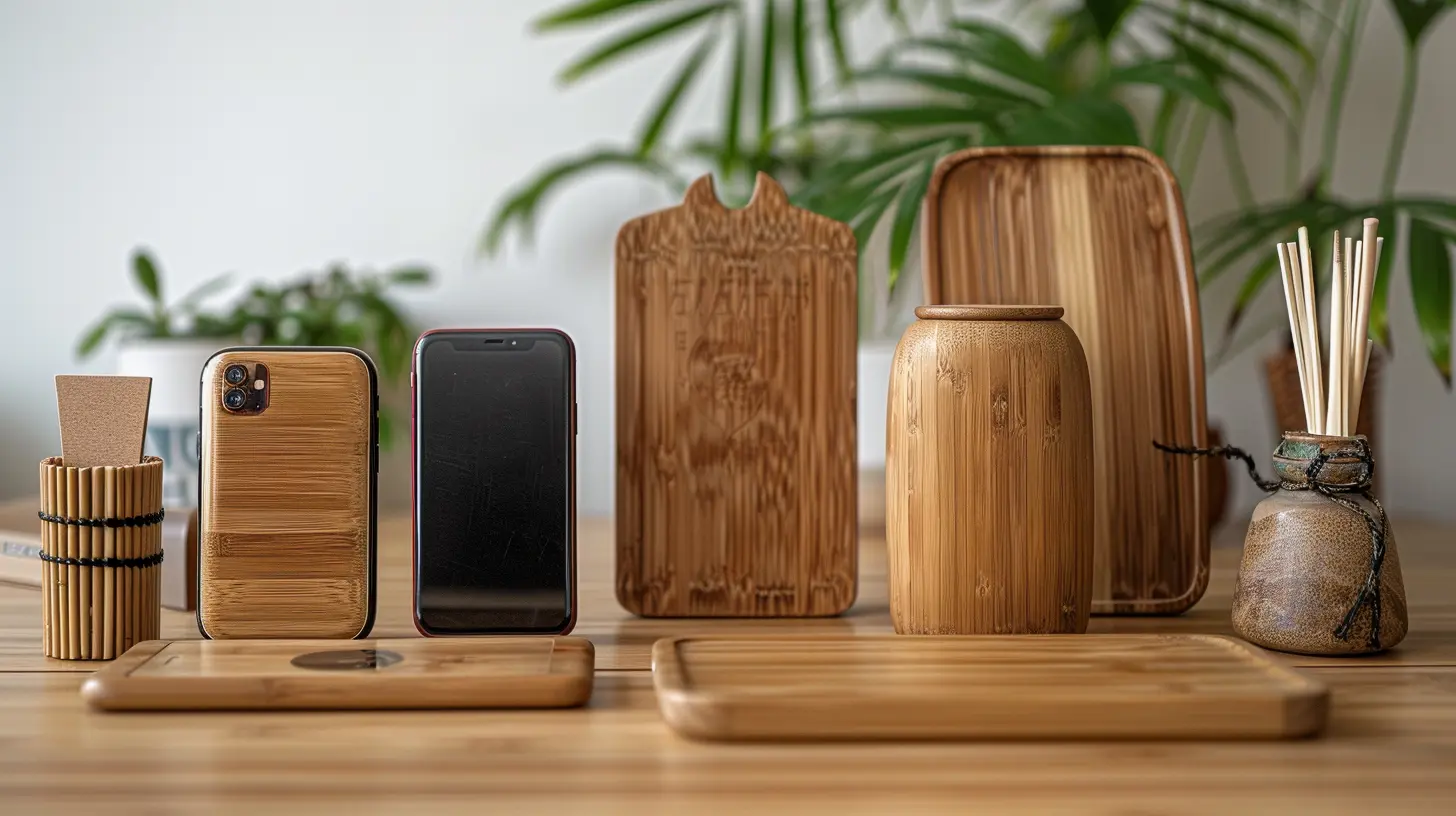Bamboo and Beyond: Sustainable Materials in Consumer Electronics
22 April 2025
It’s no secret that the world is becoming more environmentally conscious, and the tech industry is no exception. As consumers, we’re starting to ask questions we didn’t think twice about in the past: What’s in our devices? How are they made? And perhaps most importantly, how do they impact the planet? One fascinating avenue that tech companies are exploring is the use of sustainable materials in consumer electronics.
Among the eco-friendly options popping up in the tech world, bamboo has gained a lot of attention. But bamboo isn’t the only player in town – there’s also recycled plastics, biopolymers, and more. So, let’s dive into the world of sustainable materials in electronics, from bamboo to beyond, and see what’s really going on.

Why Sustainable Materials Matter More Than Ever
The tech industry is one of the largest contributors to environmental pollution. Think about it: how many gadgets do you own? Now multiply that by billions of people across the globe. That’s a lot of devices, and each one is made using materials that require mining, processing, and manufacturing – all of which consume vast amounts of energy and resources. And when these devices eventually break down or become obsolete, they often end up in landfills, contributing to e-waste.E-waste is a growing problem. According to the Global E-Waste Monitor, we generated over 53.6 million metric tons of e-waste in 2019 alone. Yikes! And it's expected to increase exponentially in the coming years. This mountain of discarded electronics is full of toxic materials like lead, mercury, and cadmium, which can leach into the environment and cause serious harm.
But here’s the good news: sustainable materials can help reduce this environmental impact. By switching to eco-friendly alternatives, we can lessen the demand for non-renewable resources, reduce pollution, and minimize e-waste. Plus, these materials often have a smaller carbon footprint thanks to more energy-efficient production processes.

Bamboo: The Star of the Show
Why Bamboo?
Bamboo isn’t just for pandas anymore. This fast-growing plant has become a poster child for sustainability due to its resilience, renewability, and versatility. Bamboo grows incredibly fast – some species can grow up to 3 feet in a single day! That’s like watching a skyscraper rise in real-time. It also doesn’t need fertilizers or pesticides to thrive, which makes its cultivation eco-friendly.When it comes to consumer electronics, bamboo has proven to be a durable, lightweight, and aesthetically pleasing alternative to traditional materials like plastic and metal. You’ll often find bamboo being used in products like phone cases, keyboards, speakers, and even laptop covers. It’s not just about the looks, though. Bamboo is strong and resistant, making it an excellent choice for products designed to last.
Bamboo in Action: Real-World Examples
One of the first companies to embrace bamboo in the tech world was Grovemade, which offers beautifully designed bamboo accessories, from phone cases to monitor stands. Their bamboo keyboard, for example, is not only functional but also adds a natural, earthy touch to your workspace.Similarly, House of Marley, a brand known for its eco-conscious ethos, uses bamboo in their audio products. Their speakers and headphones combine bamboo with other sustainable materials like recycled aluminum and organic cotton to create eco-friendly yet high-quality sound gear.
The Benefits of Bamboo in Electronics
- Rapid Growth: Bamboo grows like wildfire, which means it’s a highly renewable resource.- Biodegradable: Unlike plastic, bamboo will break down naturally over time, reducing long-term waste.
- Low Environmental Impact: Bamboo crops require minimal water and no harmful chemicals, making their cultivation much kinder to the planet.
- Durability: Bamboo is tough. It’s resistant to scratches and dings, making it perfect for products that see a lot of wear and tear.

Beyond Bamboo: Other Sustainable Materials in Tech
While bamboo has certainly earned its place in the spotlight, it’s just one part of the equation. Let’s take a look at some other sustainable materials that are making waves in the electronics industry.Recycled Plastics: Giving a Second Life to Old Materials
Plastic is an undeniable part of modern electronics. From smartphone casings to Bluetooth speakers, plastic is everywhere. But producing virgin plastic is energy-intensive and harmful to the environment. Enter recycled plastics.More and more tech companies are starting to incorporate recycled plastics into their products. Instead of creating new plastic from scratch, they’re using materials that have already been through the wringer – think old water bottles, fishing nets, and even discarded electronics.
A great example is Dell, which has been using recycled plastics in its Latitude laptops for years. They’ve even taken it a step further by using ocean-bound plastics, helping to clean up our seas while creating sustainable tech.
Biodegradable Plastics: Plastics That Break Down in the Wild
Biodegradable plastics are another promising innovation. These are plastics made from renewable resources like corn starch, sugarcane, or potato starch. When exposed to the right conditions, they break down into water, carbon dioxide, and biomass, leaving no harmful residue behind.Pela is one company that has taken this concept to heart. They produce phone cases made from a material called Flaxstic, which is a biopolymer derived from flax straw. Not only are these cases eco-friendly, but they’re also stylish and durable.
Hemp: The Comeback Kid
Hemp is another material making a comeback in the world of sustainable tech. Often associated with textiles or ropes (or, let’s be honest, something else entirely), hemp is actually a fantastic alternative to plastic. It’s biodegradable, renewable, and incredibly strong.Companies like Hemplyne are using hemp to create everything from phone cases to laptop sleeves. It’s a material that’s both eco-friendly and capable of standing up to the daily grind.
Recycled Metals: Mining the Past, Not the Earth
Metals like aluminum and copper are essential components in many electronic devices, but mining them takes a tremendous toll on the environment. Mining operations require massive amounts of energy and water, not to mention the destruction of natural habitats. That’s why recycled metals are such an exciting prospect.Apple is leading the charge here. The company has committed to using 100% recycled aluminum in the casing of its MacBooks and iPhones. This not only reduces the need for mining but also cuts down on carbon emissions during production.
Wood Composites: Bringing Nature Into Tech
Wood composites, like bamboo, are becoming more popular in the tech world. These materials combine wood with other substances (often recycled plastics or resins) to create a durable, eco-friendly alternative to traditional plastics or metals.One of the most interesting examples is WUDN, a company that makes wooden phone cases, wireless chargers, and more. Their products combine the beauty of natural wood with modern functionality, offering a unique balance between eco-friendliness and high performance.

The Challenges of Going Green in Tech
Of course, while the shift toward sustainable materials is exciting, it’s not without challenges. For one, many of these materials are still relatively new to the tech world, meaning there’s a learning curve when it comes to mass production. In some cases, eco-friendly materials can be more expensive to source or manufacture, which might drive up the cost of the final product.There’s also the issue of durability. While materials like bamboo and hemp are strong, they might not always match the longevity of traditional materials like plastic or metal. This is an important consideration since one of the greenest things we can do is make products that last longer, reducing the need for frequent replacements.
Finally, there’s the consumer side of things. While more people are starting to care about sustainability, many still prioritize price or performance over eco-friendliness. Changing consumer behavior is key to pushing the industry further toward sustainable practices.
The Future of Sustainable Materials in Electronics
So, where do we go from here? While we’ve already seen some exciting innovations, we’re really just scratching the surface of what’s possible. As more companies invest in sustainable materials, we’re likely to see even more creative solutions emerge.Imagine a world where your smartphone casing is made entirely from plant-based materials or your laptop is built from recycled ocean plastics. Or what if, one day, all our devices were fully biodegradable, breaking down naturally when we’re done with them?
It’s not as far-fetched as it sounds. Tech companies are starting to realize that sustainability isn’t just a trend – it’s the future. And as consumers, we have the power to push that future forward by supporting brands that prioritize the planet alongside innovation.
Conclusion
Bamboo and beyond – that’s where we’re headed in the world of sustainable materials in consumer electronics. From fast-growing bamboo to recycled plastics and biodegradable alternatives, the tech industry is slowly but surely embracing greener materials. While there are challenges ahead, the promise of a more sustainable future is within reach.As consumers, we have the power to make a difference by choosing eco-friendly products and advocating for sustainability in the tech world. And who knows? Maybe in a few years, all our gadgets will be as green as the bamboo forests they came from.
all images in this post were generated using AI tools
Category:
Environmental TechAuthor:

Ugo Coleman
Discussion
rate this article
7 comments
Emery Powell
This article highlights the innovative use of sustainable materials like bamboo in consumer electronics, showcasing how the tech industry is evolving toward eco-friendly practices. By prioritizing renewable resources, companies can reduce their environmental impact and appeal to environmentally-conscious consumers, paving the way for a greener future in technology.
May 9, 2025 at 10:51 AM

Ugo Coleman
Thank you for your insightful comment! We’re excited to explore how sustainable materials like bamboo can transform the tech industry and promote a greener future.
Opal Riggs
Great insights on sustainable materials! It's inspiring to see innovation in consumer electronics, making choices that benefit both the planet and consumers.
May 1, 2025 at 3:31 AM

Ugo Coleman
Thank you! I’m glad you found the insights inspiring. Sustainable innovation is key to benefiting both our planet and consumers!
Uri Cruz
Who knew my phone could be as green as my thumb? Let’s trade plastic for bamboo—just don’t expect my charger to sprout leaves anytime soon! 🌱📱
April 28, 2025 at 8:07 PM

Ugo Coleman
Absolutely! It's exciting to see how sustainable materials like bamboo can enhance our tech while keeping our planet green. 🌍✨
Carmel McLanahan
This article highlights innovative sustainable materials in tech, showcasing bamboo's potential while encouraging eco-friendly practices. A must-read for conscious consumers and industry professionals alike!
April 27, 2025 at 10:33 AM

Ugo Coleman
Thank you for your thoughtful feedback! I'm glad you found the article highlighting bamboo and sustainable materials valuable for both consumers and industry professionals.
Zina Ellison
While bamboo's eco-credentials shine, let's not forget—sustainability in tech isn't just about materials. It's also about longevity, recyclability, and innovation. Here’s hoping for more than just a green facade!
April 26, 2025 at 7:06 PM

Ugo Coleman
Absolutely, sustainability encompasses the entire lifecycle—from materials to innovation. We must prioritize true eco-friendly practices beyond just the surface. Thank you for your thoughtful insight!
Coral Cantu
Great article! It's encouraging to see the tech industry exploring sustainable materials like bamboo. As consumers, we must support these innovations and demand more eco-friendly practices to reduce our environmental impact. Keep it coming!
April 23, 2025 at 8:02 PM

Ugo Coleman
Thank you for your support! Together, we can drive the demand for sustainable materials in tech. Stay tuned for more!
Harper McDermott
This article highlights the urgent need for sustainable materials in consumer electronics, showcasing bamboo as a promising option. Emphasizing innovation, it prompts us to reconsider our consumption habits and the environmental impact of technology. Sustainable materials could redefine the industry’s future towards eco-friendliness and responsibility.
April 22, 2025 at 6:54 PM

Ugo Coleman
Thank you for your insightful comment! I completely agree that integrating sustainable materials like bamboo can significantly reshape the consumer electronics industry towards a more eco-friendly future.
MORE POSTS

How Machine Learning is Enhancing Facial Recognition Technology

Exploring the Role of AI in Telecommunications Networks

How Can We Teach AI to Make Moral Decisions?

How to Choose the Best Webcam for Streaming and Content Creation

The Role of Government in Accelerating EV Adoption

The Future of Foldable Smartphones: What to Expect